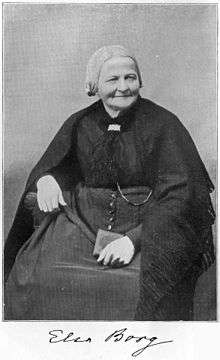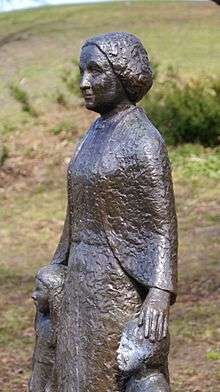Elsa Borg


Elisabeth "Elsa" Dionysia Borg (19 July 1826, Rytterne, Västmanland – 24 February 1909, Vita Bergen (White Mountains), Stockholm) was a Swedish educator and social worker. She had been a student of Cecilia Fryxell.
Elsa Borg was the daughter of the vicar Denis Borg (d. 1837) and Hedvig Elisabet Borg (d. 1830): her mother was the cousin of Pär Aron Borg. She was educated in a girls' school in first Sala and then Stockholm, and finally at the school of Cecilia Fryxell. After having completed her education, she worked as a governess. Between 1859 and 1874, Elsa Borg functioned as the principal of the Christian Girl's School in Gävle, regarded as the local pioneer educational institution for females in that city.
Elsa Borg was one of the foremost representatives of the Great Awakening in Sweden. After a visit to Great Britain in 1876 and 1878, she came to know William Boardman and Granville Waldegrave, 3rd Baron Radstock, and having returned to Sweden, she devoted herself to mission work combined with Christian social work. In 1875, Elsa Borg moved to Stockholm, where she founded a Bible Home for women with the support of Queen Sophia. The institution was situated in the Stockholm ill reputed slum of Vita Bergen (White Mountains). The home was meant to educate female Christian social workers. In 1877, it expanded to include an asylum for former female prostitutes, in 1881 an orphanage and in 1883 a hospital, and in 1885 a home for the education of missionaries: this was followed by branches in other parts of the country.
From 1885, she also published a missionary paper, Trons hvila.
Hymns
- Din Gud är när (1920)
- Sjung, Guds folk, på pilgrimsvägen
- Sjungen, syskon, under vägen (1920)
References
- Trons Hvila - Fridhälsning från Hvita Bergen 1885-1940
- Borg, Elsa, 1891: Återblick öfver Femton års Missionarbete vid Hvita Bergen i Stockholm
- Wadström, Bernhard, 1899: Elsa Borg och hennes många hem i B Wadström: Ur Minnet och Dagboken - Anteckningar från åren 1848-1898, del 2 sid 43-47
- Borg, Elsa, 1902: Några av Elsa Borgs ungdomsminnen i B Wadström: Ur Minnet och Dagboken - Anteckningar från åren 1848-1902, del 3 sid 1-22
- Ekman, E. J., 1900: Den inre missionens historia, del III sid 1655-1663, 1777 f
- Ekenstierna, Fanny, 1909: En kvinnogärning i
- Hedengren, Johannes & Beskow, Emma, 1910: Elsa Borg - Lefnadsminnen
- Jansson, E. Alfr., 1950: Missionen vid Vita Bergen - Elsa Borgs och Louise Ulffs livsgärning i barmhärtighetens tjänst
- Lövgren, Oscar, 1964: Borg, Elsa Dionysia i Psalm- och Sånglexikon, sid 98 f
- Eriksson, Monica, 1993: I Vita Bergen med Elsa Borg
- Stävare, Nils-Eije, 2009: Elsa Borg - "Vita Bergens ängel" i Tro & Liv Nr 5/2009, sid4-15
- E Elsa D Borg, urn:sbl:17978, Svenskt biografiskt lexikon (art av S. Westman.), hämtad 2014-11-30.